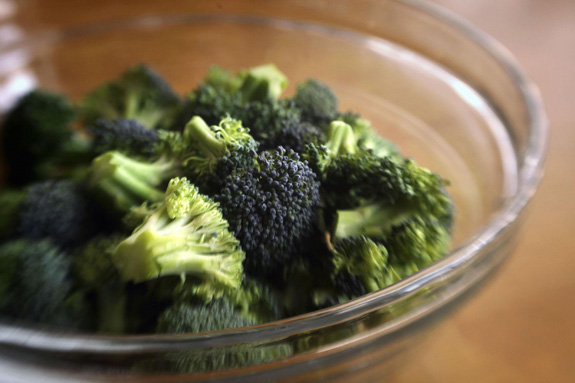Autism Symptoms Eased By Broccoli Extract, Study Finds

Researchers say that a chemical found in some vegetables may improve behavior and other symptoms in people with autism. (Mark Cornelison/Lexington Herald-Leader/MCT)
A chemical that’s found in broccoli and other vegetables may be able to dramatically improve behavior and social skills in those with autism, researchers say.
In as little as four weeks of taking daily doses of the broccoli sprout extract sulforaphane, many teens and adults with autism saw significant gains in behavior, socialization and communication, according to findings published Monday in the journal Proceedings of the National Academy of Sciences.
The study involved 40 males ages 13 to 27 with moderate to severe autism, 26 of whom received daily doses of the broccoli sprout extract while the rest were given a placebo.
Advertisement - Continue Reading Below
After 18 weeks, an assessment found that 46 percent of those taking sulforaphane showed noticeable gains in social interaction, 54 percent saw improvements in behavior and 42 percent exhibited better verbal communication.
The impact on those who received sulforaphane was profound in many cases, with some participants taking on new skills like making eye contact and shaking hands, researchers said.
“When we broke the code that revealed who was receiving sulforaphane and who got the placebo, the results weren’t surprising to us, since the improvements were so noticeable,” said Andrew Zimmerman of the Massachusetts General Hospital for Children who worked on the study.
The benefits, however, fell off after the individuals stopped taking sulforaphane, the study found.
Researchers caution that their findings will need to be replicated in a larger study and noted that about a third of those who took sulforaphane did not see any improvement. What’s more, they said the doses of sulforaphane given to study participants would be difficult to achieve by eating broccoli or other cruciferous vegetables.
Sulforaphane is believed to prompt a cellular stress response in the body much like a fever does when a person is ill. Researchers said they were inspired to try the treatment after hearing anecdotally from families that fevers seemed to trigger improvements in autism symptoms.
“We believe that this may be preliminary evidence for the first treatment for autism that improves symptoms by apparently correcting some of the underlying cellular problems,” said Paul Talalay of Johns Hopkins University School of Medicine, a co-author of the study.
Read more stories like this one. Sign up for Disability Scoop's free email newsletter to get the latest developmental disability news sent straight to your inbox.


